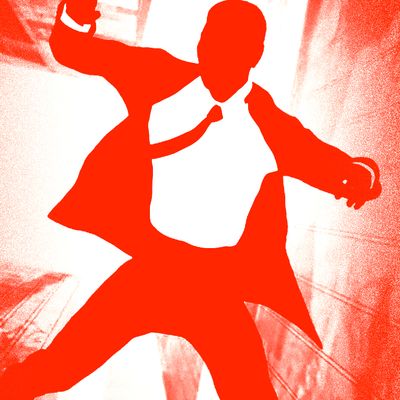
Is Mad Men going to end with one of its characters plunging out a window, literally becoming the falling man from the opening credits? Probably not, for the very simple reason that that would be a horrendous idea. (When Mad Men predicts the future, it does so with the subtlety of a brain surgeon; the falling-man idea is the equivalent of a sledgehammer hitting a nuclear bomb that’s placed atop a boom box blasting “Thus Spoke Zarathustra” as sung by Ethel Merman.) But that hasn’t stopped the show’s fans from fixating on the image of the falling man as a key to Mad Men’s final shot. Will it be Don committing suicide? Will it be Roger, who’s afraid of heights? Will it be Harry fulfilling his original destiny? Gag me with a spoon — or better yet, hit me in the face with a Sno Ball.
In the post-Lost era, it’s very hard not to treat television shows as a great assemblage of clues that will point the way to some unknown future destination. That’s just part of the deal of being a prestige drama these days — we’ll let you experiment with complex characters and unconventional narrative forms, and in return, you’ll let us examine it to death online. At its best, our collective digital soothsaying can make these shows infinitely richer; remember how you felt when you realized season five of Mad Men had been building to Lane Pryce’s death all along? But these links are apparent only in retrospect. At its worst, you get everyone’s predictions for what will happen in the Mad Men finale, which, nearly to a pixel, have been the absolute worst.
I do not exclude myself. Here’s how I saw the finale going down back in 2012:
Sally begs Don to let her go to Woodstock — he refuses, and goes himself. While relaxing in the company of naked, dirty festival-goers, Don is struck by their similarities to the hobo from his youth. Truly, he has found a place where man can be free. Upon returning home, Don changes course and allows Sally to stay with his friends in California to attend the Altamont Free Concert. The series ends with Don finally at peace, playing touch football with Bobby as Betty drives Sally to the airport, all accompanied by “You Can’t Always Get What You Want.”
That’s terrible!
The problem is that every Mad Men finale prediction is, at heart, a reflection of its creator’s hopes and dreams — and Mad Men is a show that’s wholly uninterested in catering to its viewers’ hopes and dreams. I wanted a conclusion that nodded darkly at the end of the traditional idea of “the ’60s,” and I thought it would be funny if Mad Men ended with a random Big Chill reference. You might want Peggy and Joan to end up running the company together because you love it when successful women team up. But Peggy and Joan don’t like each other all that much. To imagine them riding off into the sunset together requires ignoring every scene they’ve shared for seven years.
And just like I did with Altamont, other horrible predictions try to tie the series into historical markers, when Matthew Weiner has always been adamant about steering the show away from them. As he put it to Time, “The average person didn’t go to Woodstock. They saw the documentary a year later.” Mad Men is not Forrest Gump. Don is not going to become D.B. Cooper. Stan and Ken are not, as a friend suggested, going to end up the bearded and light-haired culprits of the Burger Chef murders. And as much as I love the idea, we’re not going to flash forward to 1974 to see Pete Campbell’s reaction to Philippe Petit. (Peeved, I’m sure.)
Since Mad Men is obsessed with the way we all end up repeating our own worst behavior, it’s also tempting to imagine its final episode coming full circle. But when we try to predict these links ahead of time, we get the falling-man theory, landing squarely on his nose. There’s comfort in imagining the finale will end with Peggy repeating Don’s first scene from the pilot or Don becoming the hobo from season one, but the only thing on Mad Men that’s that neat is the whiskey.
So, what will happen in Sunday’s finale? There’s only one thing I’m sure of: No matter what happens, it will make all of our theorizing look incredibly dumb. And if I’m wrong — hey, you can just throw me out the window.


